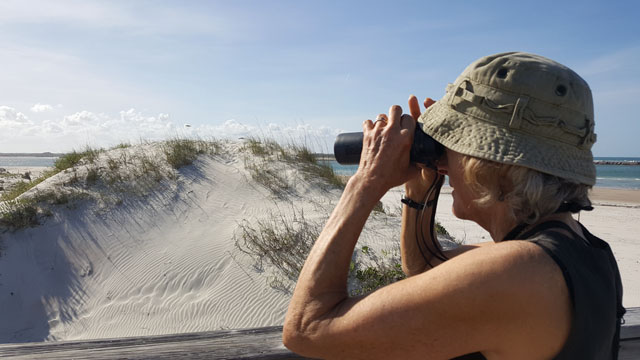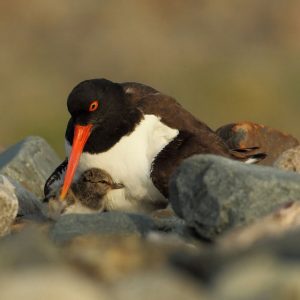In Your Words is a regular feature of Mass Audubon’s Explore member newsletter. Each issue, a Mass Audubon member, volunteer, staff member, or supporter shares his or her story—why Mass Audubon and protecting the nature of Massachusetts matters to them.

Vasha Brunelle © Frank Brunelle
Growing up in Connecticut, most of my free time was spent outdoors, usually in the woods or swamps. As an adult living on Martha’s Vineyard, I returned to the woods for long walks and started painting local birds.
About 12 years ago, a friend suggested I get involved at Felix Neck Wildlife Sanctuary. Since then, I have monitored horseshoe crabs for their citizen science project, painted several signs and murals, and served as the secretary for the Felix Neck sanctuary committee. But, perhaps, the most exciting and challenging opportunity came when I began volunteering with the sanctuary’s Coastal Waterbird Program in the spring of 2013, monitoring a pair of American oystercatchers nesting in my neighborhood.
Being new to nest monitoring, I needed help. The coastal waterbird coordinator at Felix Neck patiently showed me how and when to observe the birds, and what information to record. I was delighted the first time I saw a clutch of eggs in an oystercatcher scrape (a sandy, shallow nest dug by oystercatchers), horrified when a nest was lost to storm surge washover during a nor’easter, and ecstatic to see for the first time a chick emerging from the grasses.

American Oystercatcher © Phil Sorrentino
Since those first couple of years, I’ve learned so much more about the threats to these birds, particularly predators, weather, and disturbances from beachgoers and dogs. But the birds’ admirable resolve to breed and reproduce despite these challenges has inspired me. I’ve become adept at speaking to people I meet while out observing—answering questions or gently reminding them to be cautious in a restricted area.
It’s gratifying to observe and record data, knowing that all of this information serves an important purpose: to help us understand population trends and factors for reproductive success so we can adjust our strategies to provide the birds the best chance of survival. This summer, I will be monitoring a second oystercatcher nest, a tern colony, and a pair of osprey. If you see me out and about, stop and say hi!
Vasha Brunelle is a longtime volunteer with Felix Neck Wildlife Sanctuary’s Coastal Waterbird program, which you can learn more about on their webpage.

